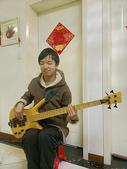 Guo Bin plays bass at his home in Wuhan, Hubei province. (PHOTO PROVIDED TO CHINA DAILY)
Guo Bin plays bass at his home in Wuhan, Hubei province. (PHOTO PROVIDED TO CHINA DAILY)
For a while, "Binbin" was a name that invoked deep sadness in people whenever they heard it, as he had been the victim of a brutal attack that made headlines across the nation. As time passed, however, his name has faded from memory. Out of the public eye, the boy embarked on a journey to that would place him under a different spotlight-on stage as a bass player.
Formally known as Guo Bin, the story of the assault on the boy, 14, ignited widespread sympathy around the world.
In September 2013, when he was 6, Binbin's eyes were gouged out by an assailant in his village in Fenxi county, Shanxi province.
Police would eventually identify his aunt, Zhang Huiying, as the suspect after DNA testing revealed his blood on her clothes.
By then, however, Zhang, 41, had committed suicide by jumping into a well, leaving the motive behind the attack a mystery.
Hearing about his plight, the Wuhan City School for the Blind got in touch with Binbin's family and offered him a free education. He entered the school in 2014 and developed an interest in music there over time.
The more time he spent at the school in the Hubei provincial capital, the more his passion for music grew. He has learned to play various instruments, including the ocarina and the hulusi, a type of Chinese flute, but he has chosen the electric bass as the one he wants to focus on to develop a career. "I like it," Guo said over the phone in a shy voice, adding he practices for two to three hours a day after school.
The boy also stated proudly that he was in a three-member band called VVM, though he failed to explain what the name means.
"I want to continue to develop on this," he added.
Guo's fascination with the bass pleases his mother, Wang Wenli, who has been worried about his future. But she admits to being somewhat concerned about how his passion may affect the family's income.
To take care of Binbin and his 16-year-old sister, Wang was a housewife until the middle of last year, when she began working in the canteen of a primary school in Wuhan. She earns more than 2,000 yuan (US$310) per month by washing vegetables and cleaning tableware.
Though her salary is not high, she is happy to have the job because she only needs to work from 6 am to 2 pm, leaving her enough time to care for her two children. And since they settled down in Wuhan, Guo's father has been working as a security guard at Binbin's school, with monthly salary of "a little over 3,000 yuan", Wang said.
Binbin's growing enthusiasm for music, however, is poised to increase the family's financial stress.
His progress has grown to the point that the school's teachers no longer have the capability to teach him. The family has to send him to a private training school to further develop his skills, but the school charges 400 yuan an hour.
Binbin currently spends an hour every week at the training school. Despite the financial burden, Wang said they will support Binbin "as long as he likes it".


